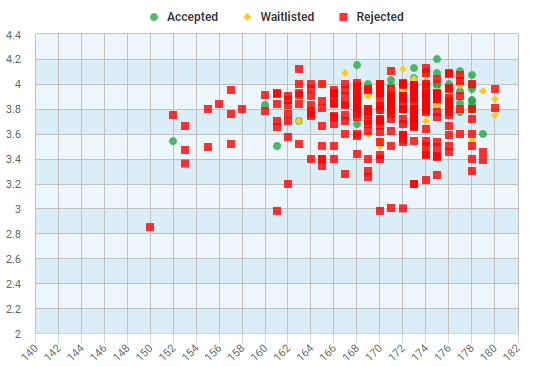Suffolk Law School
General Info

Suffolk University Law School is a private law school in downtown Boston, Massachusetts, United States. The fourth oldest law school in New England in continuous existence (after only Harvard, Yale, and Boston University), Suffolk was founded in 1906 by Gleason Archer, Sr. to provide a legal education for those who traditionally lacked the opportunity to study law because of socio-economic or racial discrimination. Originally a school that admitted men only (with New England School of Law as its sister school), Suffolk has been co-educational since 1937.
Contact information
- (Website) https://www.suffolk.edu/law
- (Admissions Dean) lawadm@suffolk.edu
- (Location) Boston, MA
Suffolk Law School Admissions
Suffolk Law School is considered a Somewhat Competitive law school, which accepts only 70% of its applicants. Comparatively, Suffolk is Significantly Higher than the average cost for law school.
| Applications | Offers | Matriculated | |
|---|---|---|---|
| Class of 2029 | 1834 | 1281 (69.85%) | 334 (18.2%) |
| 25% | Median | 75% | |
| GPA | 3.02 | 3.23 | 3.48 |
| LSAT | 145 | 150 | 154 |
Tuition And Financial Aid
| In-State Resident | Non-Resident | |
|---|---|---|
| Full Time | $46,042 | $46,042 |
| Part Time | $34,530 | $34,530 |
Living Expenses
- Living on-campus: N/A
- Living off-campus: $22,449
- Living at home: $14,898
Important Dates
- Early Decision 1: N/A
- Early Decision 2: N/A
- Regular Decision: 04/01
- Application Fee: $60
Suffolk Law School Admissions Predictor Tool
Suffolk Law School COMPARISON TOOL
Suffolk Law School


Suffolk Law School Community
Suffolk Law School is considered to have a Somewhat Favorable student to faculty ratio. The average class size for 1L sections is approximately Above Average compared to other law schools. Student diversity at Suffolk is Below Average.
Student body
Faculty Statistics
- Full Time: 66
- Part Time: 68
Faculty
- # Female Faculty: 68
- # Minority Faculty: 19
Ratio
17.9 Students
1 Faculty
Housing Options
- On Campus Housing: No
- Graduate Housing: No
- Law Specific Housing: No
Suffolk Law School Curriculum
The size of 1L sections affects the quality and consistency of teaching in law schools. Generally with smaller 1L section sizes, students receive more individualized attention. Suffolk Law School 1L section size is 24% larger than law schools in Massachusetts and 34% larger than all PRIVATE law schools.
1L Section Size Comparison
Positions Available in Advanced Courses
- Simulation Courses: 909
- Faculty Supervised Clinics: 96
Students Involved in Advanced Activities
- Field Placements: 75
- Law Journals: 234
- Moot Court/Mock Trials: 0
Attrition Rates
- First Year: 21.7%
- Second Year: 1.3%
- Third Year: 0.0%
- Fourth Year: 0.0%
Suffolk Law School Employment
Deciding to attend law school requires a large financial investment with the goal of securing employment upon graduation. The Suffolk Law School class of 2024 had an employment rate of 84% with 1% pursuing an additional degree.
Employment Comparison
In 2024, 94.3%% of students reported their employment status 9-months after graduation.
Type of Employment
- Law Firms: 43.0%
- Business: 33.0%
- Government: 15.0%
- Public Interest: 2.0%
- Academia: 2.0%
- Massachusetts: 77%
- New York: 4%
- Rhode Island: 3%
Bar Passage Rates
- Reporting: 94.3%
- First Time Takers: 504
- Average School: 75.8%
- Average State: 83.2%
- Pass Difference: -7.4%
Top Bar Jurisdiction
- Massachusetts: 83.2%
- Passed: 360 of 475 (75.8%)
- State Average: 83.2%
- Difference: -7.4%
